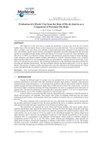Assessment of the hydroalcoholic extract and powder cocoa bean shell as corrosion inhibitors for carbon steel in sodium chloride solution
IF 1.2
4区 材料科学
Q4 MATERIALS SCIENCE, MULTIDISCIPLINARY
引用次数: 2
Abstract
Carbon steel is used in various applications because of its excellent weldability, good mechanical resistance and low cost. However, its application becomes restricted due to its low corrosion resistance in neutral and acidic media, and it is necessary to use processes to retard the corrosive mechanism, such as the use of inhibitors. Many of the effective synthetic inhibitors used are associated with high cost and some have a high toxicity. In recent years, studies of corrosion inhibitors obtained from natural products have been increasing because they are environmentally sustainable and presents low-cost. Therefore, in the present study, different concentrations of the cocoa shell powder (Theobroma cacao) and hydroalcoholic extract were evaluated as a corrosion inhibitors of SAE 1008 carbon steel in 0.5 mol.L-1 sodium chloride solution. The inhibitory action of the cocoa residue was studied through gravimetric technique and electrochemical impedance spectroscopy (EIS). For the chemical characterization of the inhibitor, the Fourier Transform Infrared Spectroscopy (FTIR) was used. The EIS results showed that the corrosion inhibition efficiency of the steel decreased with the inhibitor concentration, reaching maximum values of 55.97% and 72.93%, for cocoa shell powder and hydroalcoholic extract, respectively. The gravimetric data confirmed the electrochemical results and through the study of the adsorption mechanism it was verified that the adsorbed inhibitor molecules follow the FloryHuggins isotherm model, for both forms of the inhibitor. For all the concentrations evaluated, the cocoa shell powder did not represent an efficient corrosion inhibitor. In contrast, for the hydroalcoholic extract, at the concentration of 0.44 g.L-1, a good performance was verified as a corrosion inhibitor of SAE 1008 carbon steel in 0.5 mol.L-1 sodium chloride solution. Keywords: Carbon steel, Theobroma cacao, Natural Corrosion Inhibitor, EIS, Gravimetric Technique.氢醇提取物和可可豆壳粉在氯化钠溶液中作为碳钢缓蚀剂的评价
碳钢因其优良的可焊性、良好的机械阻力和低廉的成本而被广泛应用于各种领域。然而,由于其在中性和酸性介质中的耐腐蚀性较低,其应用受到限制,需要使用抑制剂等工艺来延缓其腐蚀机理。使用的许多有效的合成抑制剂成本高,有些具有高毒性。近年来,从天然产物中提取缓蚀剂的研究越来越多,因为它们具有环境可持续性和低成本的特点。因此,在本研究中,不同浓度的可可壳粉(Theobroma cacao)和水醇提取物在0.5 mol.L-1氯化钠溶液中作为sae1008碳钢的缓蚀剂进行了评估。采用重量法和电化学阻抗谱法研究了可可渣的抑菌作用。利用傅里叶变换红外光谱(FTIR)对缓蚀剂进行了化学表征。EIS结果表明,随着缓蚀剂浓度的增加,钢的缓蚀效率降低,对可可壳粉和水醇提取物的缓蚀效率分别达到55.97%和72.93%的最大值。重量数据证实了电化学结果,通过对吸附机理的研究,证实了吸附的抑制剂分子符合FloryHuggins等温模型,对于两种形式的抑制剂都是如此。对于所有的浓度评估,可可壳粉不代表一个有效的缓蚀剂。相比之下,对于水醇提取物,浓度为0.44 g。L-1在0.5 mol.L-1氯化钠溶液中作为sae1008碳钢的缓蚀剂,具有良好的缓蚀性能。关键词:碳钢,可可,天然缓蚀剂,EIS,重量法
本文章由计算机程序翻译,如有差异,请以英文原文为准。
求助全文
约1分钟内获得全文
求助全文
来源期刊

Materia-rio De Janeiro
MATERIALS SCIENCE, MULTIDISCIPLINARY-
CiteScore
1.00
自引率
25.00%
发文量
51
审稿时长
6 weeks
期刊介绍:
All the articles are submitted to a careful peer-reviewing evaluation process by the journal''s Editorial Board. The Editorial Board, reviewers and authors make use of a web based proprietary automated tool to deal with the reviewing procedures.the Revista Matéria''s article reviewing restricted access system - SEER. Authors are not informed about the identity of the reviewers.
 求助内容:
求助内容: 应助结果提醒方式:
应助结果提醒方式:


